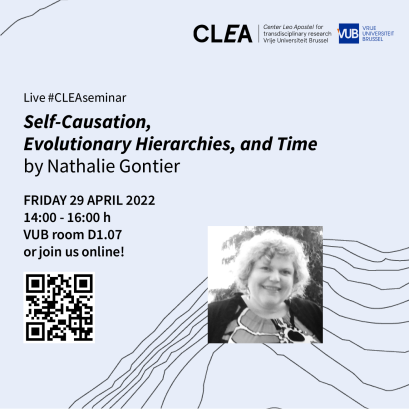With her research group, Nathalie Gontier provides a theoretical framework wherein she proposes to understand teleonomy as a problem of self-causation. She situates self-causation along upward, downward, and reticulate causal theories. Causal theories in biology today are often formulated in hierarchy theories where causation is conceptualized as running up or down the rungs of a ladder-like hierarchy, or, more recently also as moving between multiple hierarchies. Her group here demonstrates that in addition to hierarchy theories, causal theories depend upon ideas on time. The Neodarwinian synthesis adheres to a notion of upward causation that associates with linear hierarchies and linear notions of time. Eco-Evo-Devo schools recognize the importance of downward causation and such receives resistance from the standard view because downward causation is sometimes understood as backward causation, which is considered impossible by adherents of a linear time model. Instead, she demonstrates that downward causation works with a spatial or presential time notion. Hybridization, lateral gene transfer, infective heredity, symbiosis and symbiogenesis require her to recognize the existence of reticulate causation, and this occurs in both space and time or spacetime, between distinct and interacting ontological hierarchies. Teleonomy is distinct from these types of causation and instead concerns the problem of self-causation. By asking how focal levels in a hierarchy can persist through time, self-causation raises philosophical concerns on the nature of duration, individuality, and identity.
The Speaker
Nathalie Gontier is a researcher for the Faculty of Science of the University of Lisbon, sponsored by the Portuguese Foundation for Science and Technology under law 57/2016, and she is an Integrated Member of the Center for Philosophy of Sciences where, since 2012, she is the director of AppEEL, The Applied Evolutionary Epistemology Lab, that was founded with the support of the John Templeton Foundation. She has a background in both Philosophy and Comparative Science of Cultures (Cultural Anthropology), and she holds a PhD in Philosophy of Science. She is the Editor-in-Chief of the Springer Nature Book Series Interdisciplinary Evolution Research, Associate editor for Evolutionary Biology, Advisory Editorial Board Member for Theoria et Historia Scientiarum, and Review Editor for Frontiers in Psychology/Theoretical and Philosophical Psychology. She seats on the permanent board of the Protolang Conference Series, she is a Member of the Third Way of Evolution, and a collaborator for the Astra project. Her publications include a monograph on theories on the origin and evolution of life that deviate from the standard paradigm (in Dutch), and she has edited several books and academic journals on topics of biological, linguistic and sociocultural evolution. Her personal website can be found here.
Practical
The CLEA seminars are taking place simultaneously at the VUB campus in Etterbeek, Brussels, and online (via Zoom) and are open to everyone interested!
When. Friday April 29, 2022 from 14:00 until 16:00h
Where (live). VUB campus Etterbeek, room D.1.07
Online. You can follow online via Zoom: https://tinyurl.com/yc82dwht
Video
Acknowledgement
This seminar was supported by the John Templeton Foundation through the grant ID61733 The Origins of Goal-Directedness.

